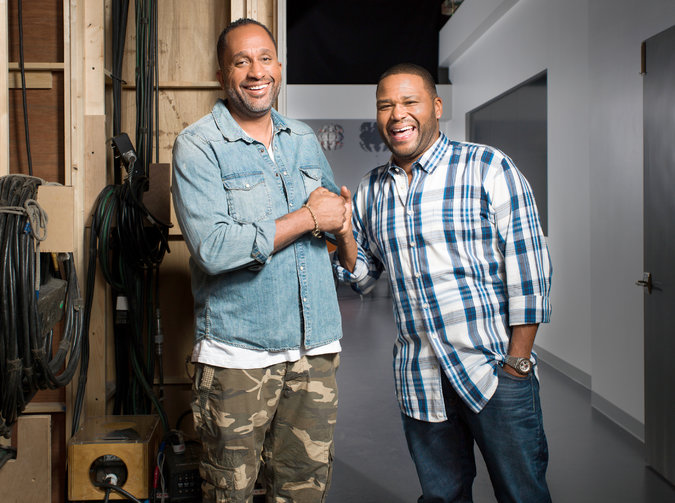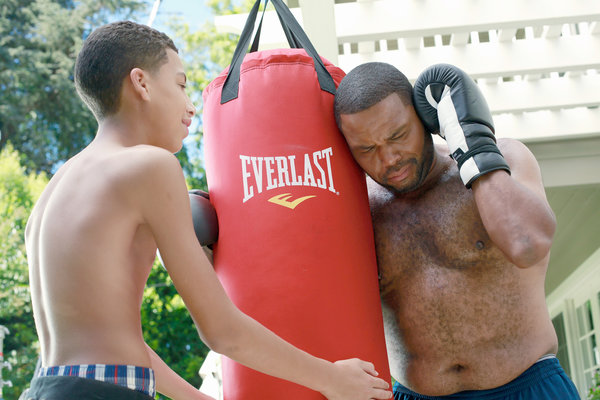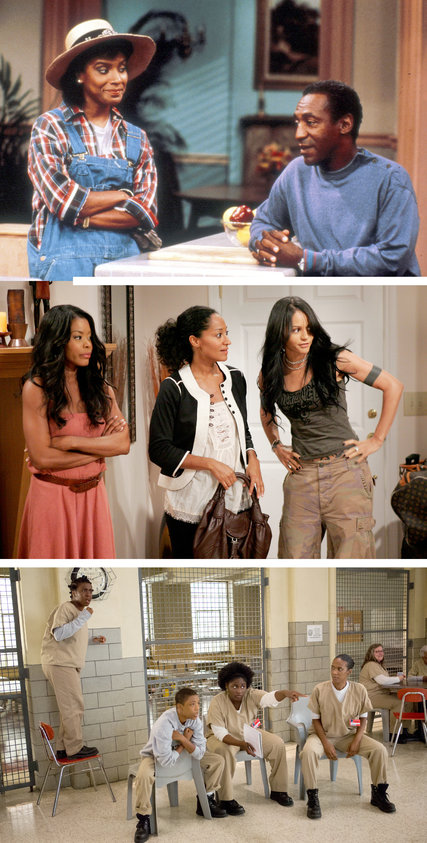
The first time I heard about “Black-ish,” ABC’s new sitcom about an affluent black family in Los Angeles, I was skeptical about its premise. Early commercials and previews played up tired stereotypes about “acting white,” made jokes about curvy behinds and took shots at the heritage of the show’s biracial matriarch, played by the effervescent Tracee Ellis Ross. The coup de grâce was the title, which seemed to suggest that the family’s status was not in line with it means to be authentically black in America.
But a few episodes in, the show has taken a much more nuanced and complicated dive into racial identity than initially advertised, particularly in the way it weaves plotlines around assimilation and appropriation, and how they impact black culture. In one episode, Anthony Anderson, who plays the father, frets over his son’s decision to go by Andy, instead of Andre, at his predominantly white school. In another, he lectures his son on the importance of acknowledging other black people he encounters, saying, “No matter who you are, or where you’re at, it’s your duty to give ‘the nod.’ ”

And hovering above all that is a more subtle — and quietly clever — narrative arc, involving the gap between parents and children and how each generation has a different awareness of what it means to be black in 2014.
“The PC way of handling culture has been to not talk about it,” Kenya Barris, the show’s creator, said in an interview. “But we should be talking about it.”
And so far, his approach seems to be a hit. The premiere resonated with critics and attracted a robust 11 million viewers, besides generating a lot of positive reactions and discussions on social media. In a vote of confidence, ABC has given the show a full-season order.
That news is thrilling because I am rooting for “Black-ish.” I want it to succeed because the show arrives when black characters on mainstream broadcast networks who directly deal with issues like race are incredibly rare.
Maybe it isn’t fair to hold a new show to such high expectations. But being a black consumer of media requires a certain disconnect from reality, since the world you see on screen rarely reflects your own. TV is resplendent with ethnically diverse casts, from procedurals like “Law & Order: SVU” and “NCIS: Los Angeles” to hits like “Scandal” and “Elementary” to sitcoms like “New Girl” and “Brooklyn Nine-Nine.”
But the characters on those series don’t often deal directly with racial issues in everyday life and, by not doing so, perpetuate another kind of colorblindness, one that homogenizes characters and treats race as inconsequential, when it is anything but. To those watching at home, it seems as if networks think that post-racial story lines are the only acceptable ways of showcasing black characters on television.
What black viewers are left with instead, said Dayna Chatman, a media researcher at the Annenberg School for Communication and Journalism at the University of Southern California, is a dynamic that “makes whiteness the norm.” Ms. Chatman noted that reality television often showcases African-Americans, but since that genre is often about over-the-top performances, she said, it isn’t “particularly representative or flattering.”
In other words, there’s no middle ground: Either race is largely absent or exaggerated to the point of caricature. The lack of texture and diversity on television is harder to ignore amid the rise of streaming and online series (say, Netflix’s “Orange Is the New Black” or Issa Rae’s “The Misadventures of Awkward Black Girl”) as well as social media like Instagram and Vine (see King Bach’s account). They offer a welcome and much more nuanced window into black humor and culture.
The last time I remember TV reflecting my world was the ’90s and early aughts. Growing up, I flipped among “Moesha,” “Martin,” “Girlfriends,” “Living Single,” “Family Matters,” “The Parkers” and “The Fresh Prince of Bel-Air” and drank in the stories of characters who looked and sounded a lot like me. I identified with the nerdy twin on “Sister, Sister” and related to the complicated dynamics in the friendships of Lynn, Joan (a younger Ms. Ross), Maya and Toni on “Girlfriends.”
It’s important to note that these shows didn’t appeal to me because they dealt with race. For the most part, they didn’t, at least not directly. They simply offered more fully rounded representations of the many types of people in the world.
I watched those shows — and many others — but didn’t realize how lucky I was to have so many options until they slowly disappeared, and little else emerged in their place. There’s Tyler Perry, who makes shows and movies with largely black casts for a largely black demographic, but his sensibility doesn’t resonate with every black viewer. I simply want a slate of offerings similar to the one white viewers get.

Shola Lynch, a curator at the Schomburg Center for Research in Black Culture in Harlem, said American networks and investors often avoided TV shows and movies with mostly black casts. Ms. Lynch, a filmmaker, is most familiar with the movie industry, although she said the situation extends to television as well.
“The business explanation is always that this isn’t what the marketplace is asking for,” Ms. Lynch said, adding that in her experience, that is not typically the case. She pointed to “Lee Daniels’ The Butler,” “Fruitvale Station” and “12 Years a Slave” as recent movies that performed very well with audiences and picked up prestigious awards, and noted that they were supported and initially financed by entities outside Hollywood. This month, “Dear White People,” a sharp comedy about a young biracial woman tired of dealing with microaggressions at her fictional Ivy League university, opened to much critical praise.
Mr. Barris said that there were signs of change in TV as well. He said ABC and cable networks pursued him and the “Black-ish” pilot “very aggressively.” Contrary to popular belief, networks “are looking for something that deals with diversity,” he said. “The problem has been timing and having the right package behind it.”
Gene Demby, a writer for Code Switch, an NPR blog on race and culture, said that the lack of mainstream black television, or even shows that deal with race, is strange given the current popular culture landscape, which is overflowing with prominent black figures. “This is the first time in American history where the most famous people in America are black,” he said, naming the Obama family and the musicians Kanye West and Beyoncé. “But there’s still a really obvious invisibility on television.”
That absence is in part what prompted my initial skepticism of “Black-ish,” one that was shared by friends and blogosphere types alike. After seeing few shows about black people on TV, to have one emerge that wanted to deal with race directly was unnerving, and we were all unsure whether it would simply reinforce stereotypes and clichés rather than explore the depth and breadth of black culture and the black experience in America.
Mr. Barris said he was determined to do more than create a successor to “The Cosby Show,” although “Black-ish” draws from its legacy. But while the popularity of the Huxtable family centered on its warmth and relatability, it was, Mr. Barris said, “about a family that happened to be black.” He added that he wanted his show to be much more cognizant of modern racial identity, and to reflect the class and racial dynamics of being black in America.
It’s a fine line to walk. Ms. Chatman, the media researcher, said that since there are so few shows — outside sketch comedy — that try to tackle the experience of African-Americans, the effort is fraught for the very audience that show runners are after.
“We are hyperaware of how people and the media perceive us,” she said. “And who gets it and who doesn’t get it.”
Ms. Chatman cited Dave Chappelle and how his attempts to use humor to destabilize racial stereotypes seemed to backfire.
In 2005, Mr. Chappelle walked away from his lucrative show on Comedy Central after expressing discomfort that the line between his social commentary and racial satire had grown too thin. Years later, he would tell Oprah Winfrey that he had begun to feel uncomfortable.
Today, there are a few other shows operating in the space left behind by Mr. Chappelle, including “Key & Peele” on Comedy Central and “Black Jesus” on Adult Swim. But those are cable outlets with smaller audiences, whereas “Black-ish” is on a mainstream network.
What legacy will “Black-ish” leave, if any? What shows might it pave the way for? Some that deal more directly and honestly with race, in the same way we see the rest of mainstream television deal with the complexities of the human experience?
Mr. Demby, of NPR, said that whether Mr. Barris is prepared for it, time will tell: “No show should be encumbered with the weight of representing a barrier for future television casts. But the crazy thing is, whether they want to or not, the creators of ‘Black-ish’ are weighted with that.”